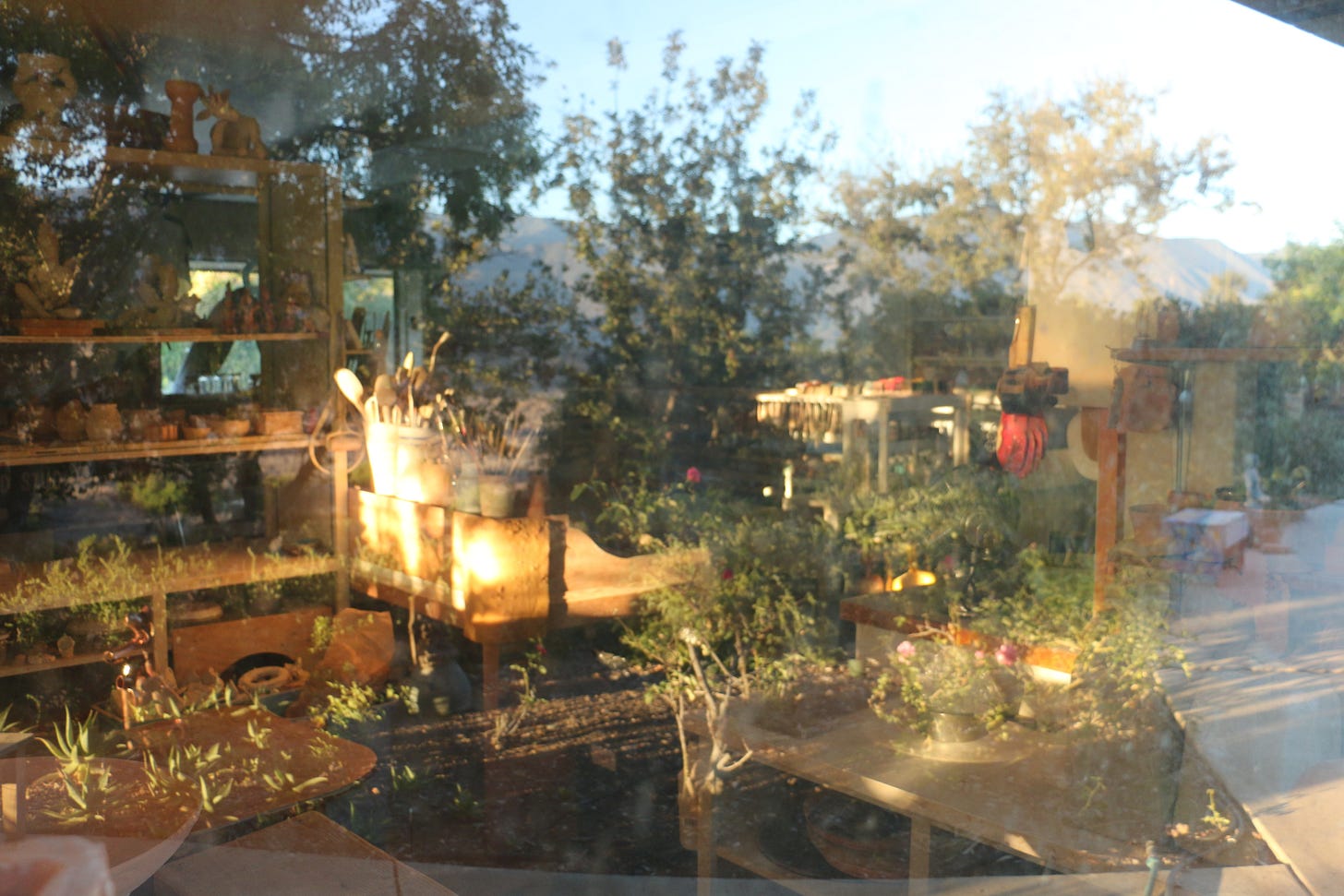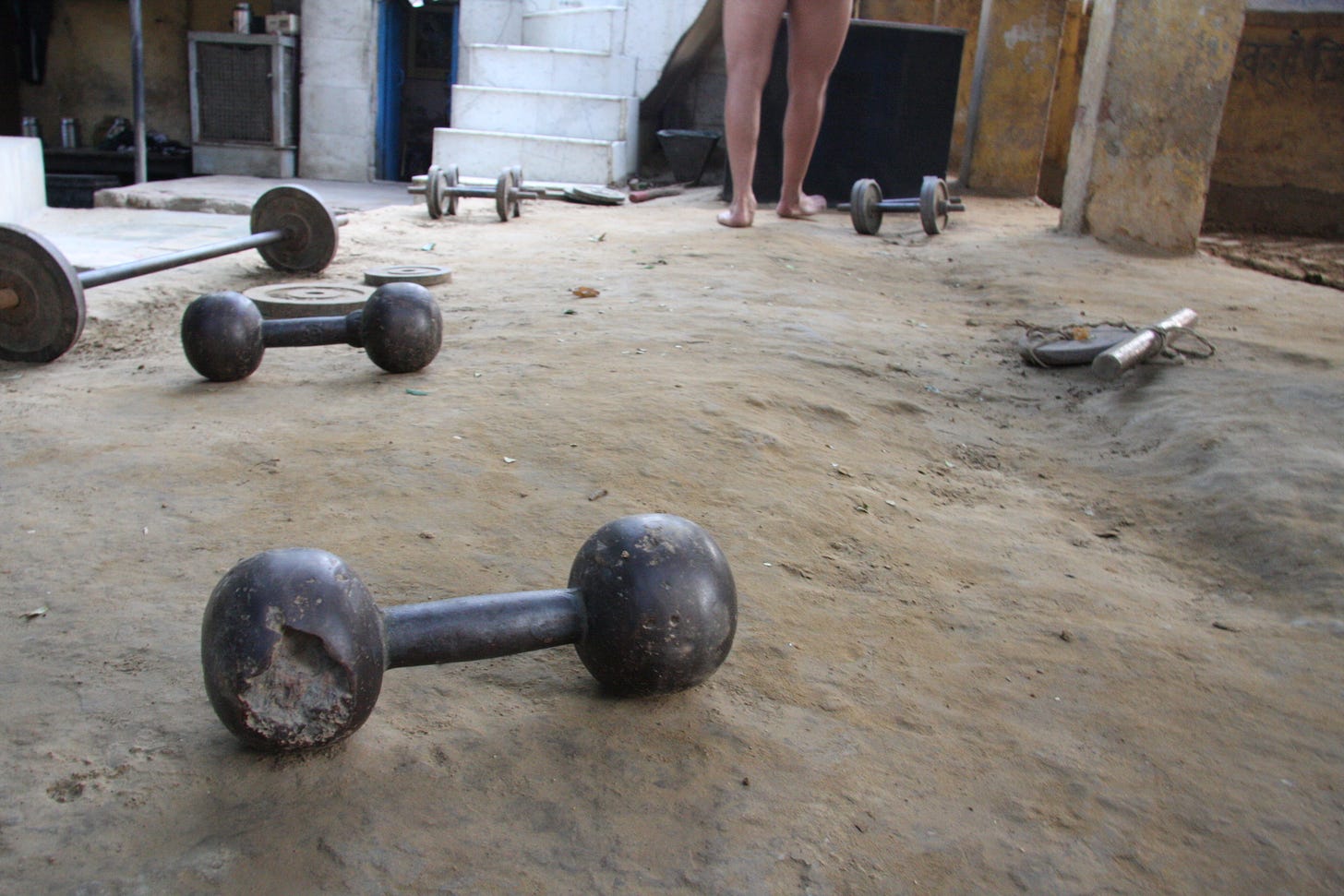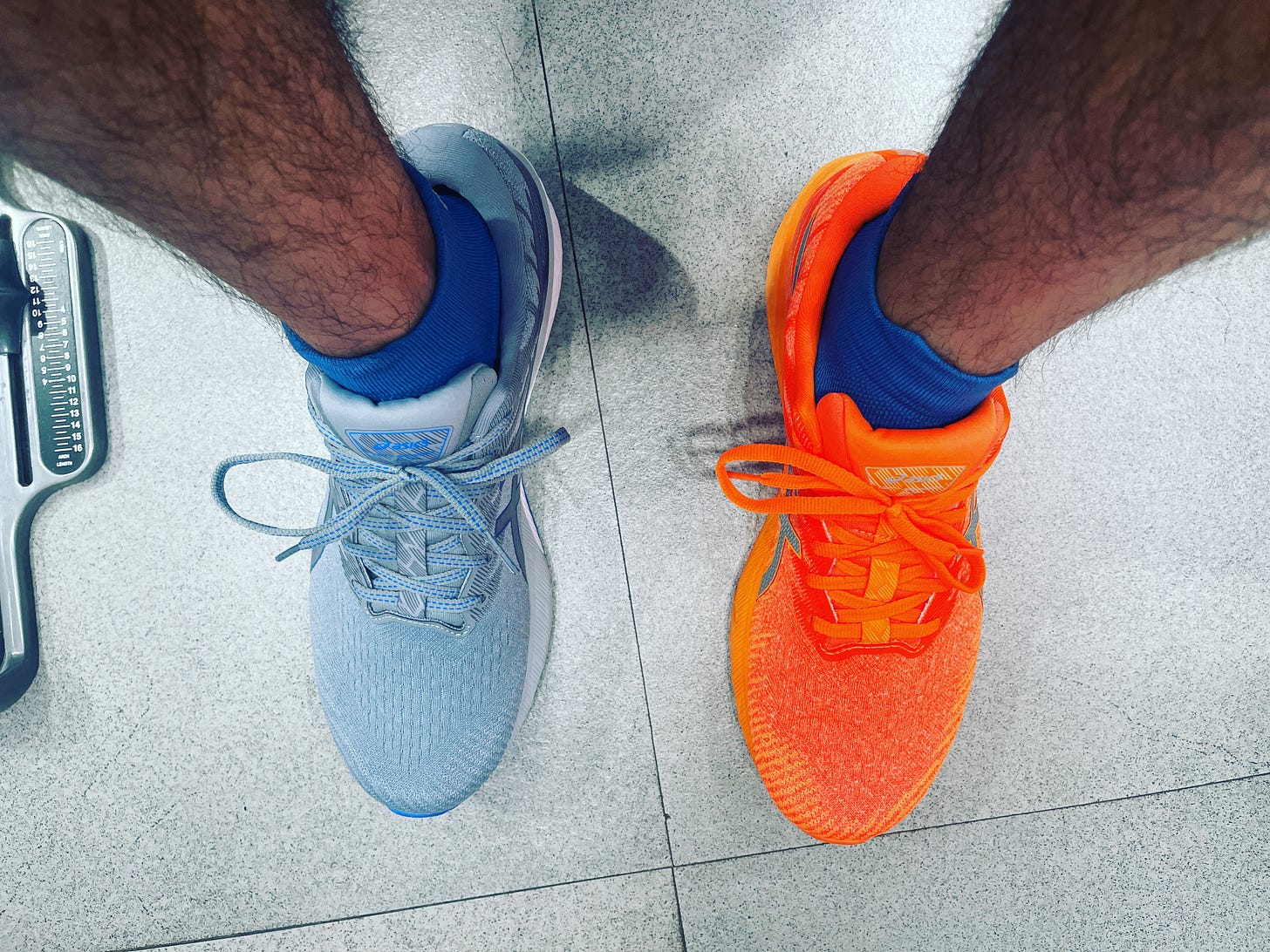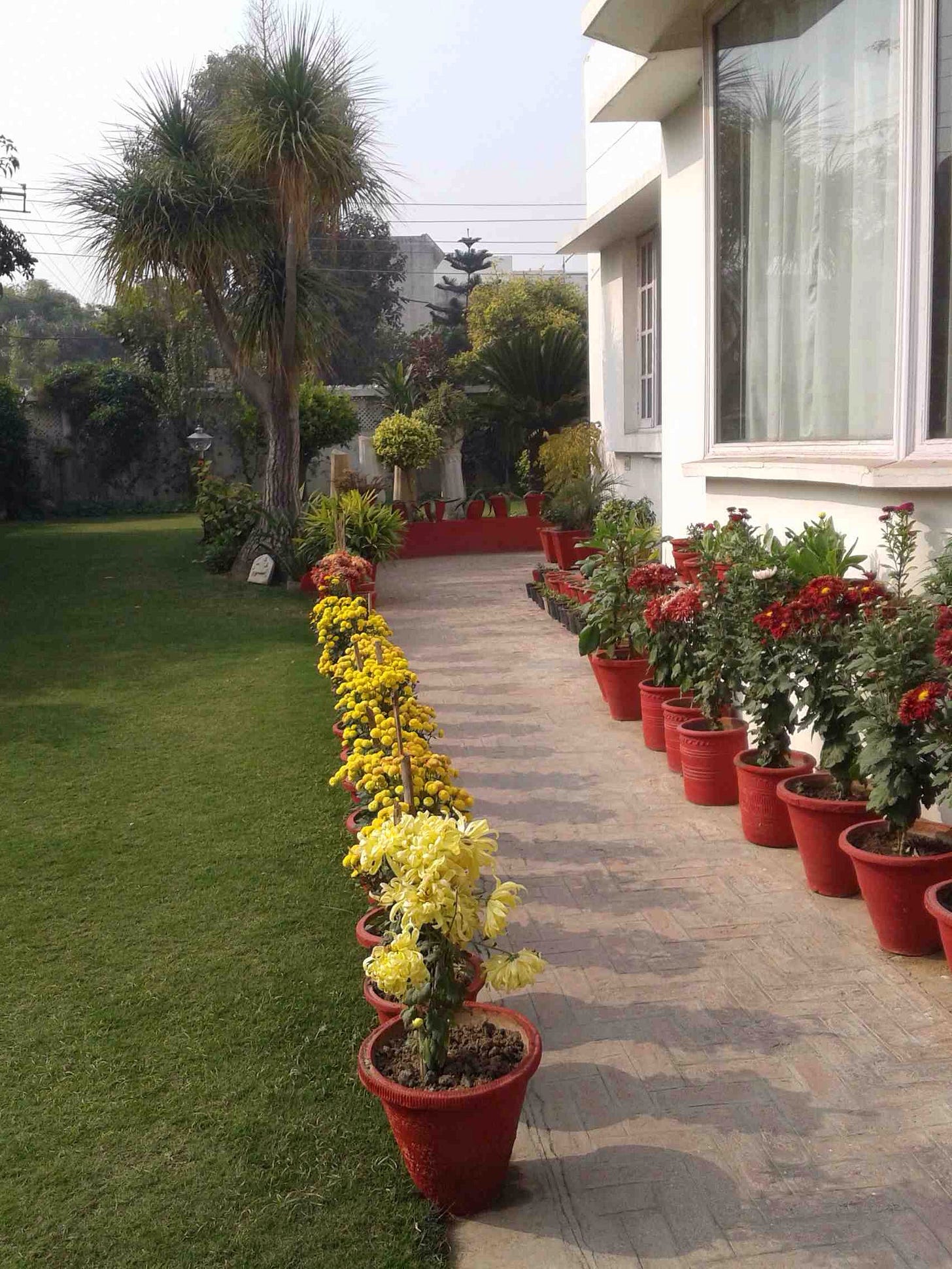Yet Untitled 110 - ‘Deliberate Imbalance Practices’
Getting lost by design, so that I get to find my way back
Dearest Yet Untitler,
How are you?
Seriously. Hit reply and tell me. Especially if you’re someone who I’ve never met. If that’s so, then imagine: we’ve never laid eyes on each other and here I am occupying your inbox each week! The least I can do is ask after you.
And hey - no pressure! While I always feel truly delighted when I hear back from a reader; if I don’t, that’s also cool 😎. I’m genuinely grateful that you opted in and decided to stay!
This week I’m going to take you into my world a bit - the world of writing for the screen - explained through what I hope are effective metaphors from my sporty life (which I hope to jump start again after a markedly less active more sedentary 2024 after my brush with pneumonia).
Writing hard!
I’ve been very immersed in writing over the past week - not like with water coming up to my nose, but definitely up to my chin. The current I swim against has been strong enough for me to work up a sweat. As it’s Olympics season, let’s diversify with the sports, going from swimming to running - I feel like this past week is like one of those runs where I know I’ll be out of breath when I finish, but will still be standing. When I run such runs, which I sometimes call ‘healthy runs’ (simply because they don’t knock me dead), I’m able to think about things like breathing, cadence and technique, even making the effort to improve on these things as I plod along.
Similarly, when I’m writing ‘healthily’ (challenging myself but not to do the running equivalent of hurtling up a hill at full throttle until my lungs combust), I can think about method, approach, technique and even try to improve upon these as I scratch and tap along. Usually this happens when I’ve managed my time intelligently and deadlines aren’t scaring the bejeezus out of me.
That’s been the tempo of the past weeks, and I’ve been subconsciously reflecting about process. It happens rarely. Like, how often would I think about how I use a knife and fork? Now, after writing for 20 years, I usually just in and that’s that.
This time, I managed to retrieve a few insights and am happy to do my best and serve ‘em up. It’s a bit of a ramble, so please bear with me.
Resistance, Orientation and Getting Lost
There is no challenge without resistance, and I find that resistance provides a sense of orientation. As in - you’re able to tell whether you’ve improved or not according to how you respond to resistance. Over time, over continuous resistance, your bones tend to get stronger, and you learn to tread in a way that makes your joints ache less.
Orientation is a hard thing to find when you’re writing alone. You can get lost! Writing in ‘rooms’ for Netflix and is a potentially, dynamic and fun experience where your partners play a big part in orienting you and you play your important role of orienting them. I’ve been writing alone these past weeks, and I’ve spent a lot of time lost.
This isn’t necessarily a bad thing.
I do find it thrilling to find myself lost when writing alone; having to then find my way back home. It isn’t pretty, not knowing where you are as, day after day, the distance between you and your deadline shortens. Despite this, I have seen myself play the gamble, getting myself lost deliberately. Even if I say to myself that I’m doing this to generate better work, it still sounds reckless to me.
This is by no means intended as an abstraction about the airy, removed world of creative life. Bono of U2 described how Leonard Cohen approached his creative life in the documentary ‘I’m Your Man’ - like a carpenter, who (to paraphrase) would work on a song like he would on a door, hammering and chiseling until the desired result was achieved.

Is hammering and chiseling creative ideas similar in principle to hammering and chiseling wood to craft a door? I’d say so. I guess you choose and use the tools you need to get the result you want. Thinking about this; I’m sure I’d be pretty shite at using hammers and chisels on wood right now if I had to. I would have to learn how to use them, just as I had to learn how to use writing tools - patiently, over time.
My ‘lose yourself’ tool
In my conversations with the Mr. India film director Shekhar Kapur, he shared his personal motto: “Exist in Chaos”. Rapper Eminem held forth on the merits of losing oneself in an eponymous song.
While I’ve not yet hit the evolutionary milestone of seeing the world like Shekhar does, I find that employing this strategy in my writing has had interesting results.
Here’s roughly how I work it:
All kinds of stuff pops into your head while writing. Some of it makes sense, some of it does not. While it feels safer to stick to the ideas that make sense, when writing alone, I feel a special draw to the ideas that do not.
While writing alone, I can throw unsafe ideas into the mix without any external resistance. So I do it, hazarding being potentially lost. For a long while, I’ll watch how this seemingly alien idea sits like a wart in the middle of my other neat, painstakingly crafted ideas. It initially generates stress, but over time I reconsider and say that such a practice generates tension. Energy.
Initially, I found it scary, because like anyone else - I like to feel safe and proceed with knowing rather than not knowing especially down the precarious road towards creating new material. Why would I deploy this dumb method anyway - deliberately throwing myself into uncertainty while the foundations of the idea are still solidifying?
I think what gave me courage to keep going with this deliberate practice of ‘inviting unsteadiness’ was my belief in good films and book being ones that, to some degree, unhinge my presumptions. This has always felt a fair transaction to me - exchanging money and time for being shaken up every once in a bit. Hell, life does it to you anyway. If in choosing this deliberate imbalance I end up emulating life in a more accurate way, it feels like the right thing - in my book, anyway.
I have found that doing this makes room for surprise. Writing YU has been a great teacher. Come Thursday, I stand before an idea that draws me, but I yet don’t know why. I open the door and walk in without seeing the ground on the other side, not seeing the road home. But…
…having found my way home week after week, I have begun to trust that my foot will land. In the face of this repeated unsteadiness each week, what’s a little deliberate untidiness in a working draft then, when the deadline is still a few weeks off?
I said it, but it still feels precarious when I do it 😆.
The Road home
I think it’s fair to say the writing a new draft is like getting lost, and then finding your way home.
Becoming adept at finding your way home is a good practice and comes with its rewards. It’s not in the getting lost but in finding my way back that I have made the most fascinating discoveries. Getting lost is…getting lost. You lose the familiar. You lose composure. You lose comfort. Finding the way back, especially when you emerge from the bush and see the familiar again…is joy!
One takeaway is that I usually realize that I was never lost in the first place; that my inner life had mapped everything out before casting this supposedly wild and unrelated idea into the mix. At that point all I want to say is
“ah, hello inner life. I see what you’re saying. Can you please learn to talk in clearer tones. Perhaps we’ll all have an easier time of it without any of this ‘getting lost’ business!”
“Tut tut”, my inner life replies. Where’s the fun in that?”, followed by a bevy of inner-life emojis.
Thanks for listening,
Lots of love
V
And
PS:
In my experience, first drafts are sacred. Everything changes when you submit.
Submitting means that at some stage I’ll receive feedback, and feedback invariably robs the process of its innocence. After feedback, the work will develop zits, its voice will start cracking and its limbs will appear long and gangly. Of course, a few stages down, this adolescent awkwardness will disappear and the work will become an adult - pimples gone and it’s fine form standing before you.
In my world, a lot of what I wrote above happens before that first round of feedback. Having survived the turbulence of getting lost, I’m now at the cruising altitude, finding my way home.
I love the thin air of this crushing altitude. It’s heady. I only occupy it for a short period, perhaps a few weeks at a stretch. In a run, sometimes you hit a rhythm where it feels like you’ve stopped relying on oxygen and some other engine altogether is propelling your body forward.
I always wish that the entire run could be like this, but it never is.
Perhaps it will never be. But I’m happy to have this feeling even in its most limited form, just like I’m happy to have had Ananya and Aahana’s childhood to enjoy while it’s there.
Did this ramble resonate? Hit comment and let me know. Point out the thing that I’m circling if you have better words to describe it! I’d love to hear from you!











